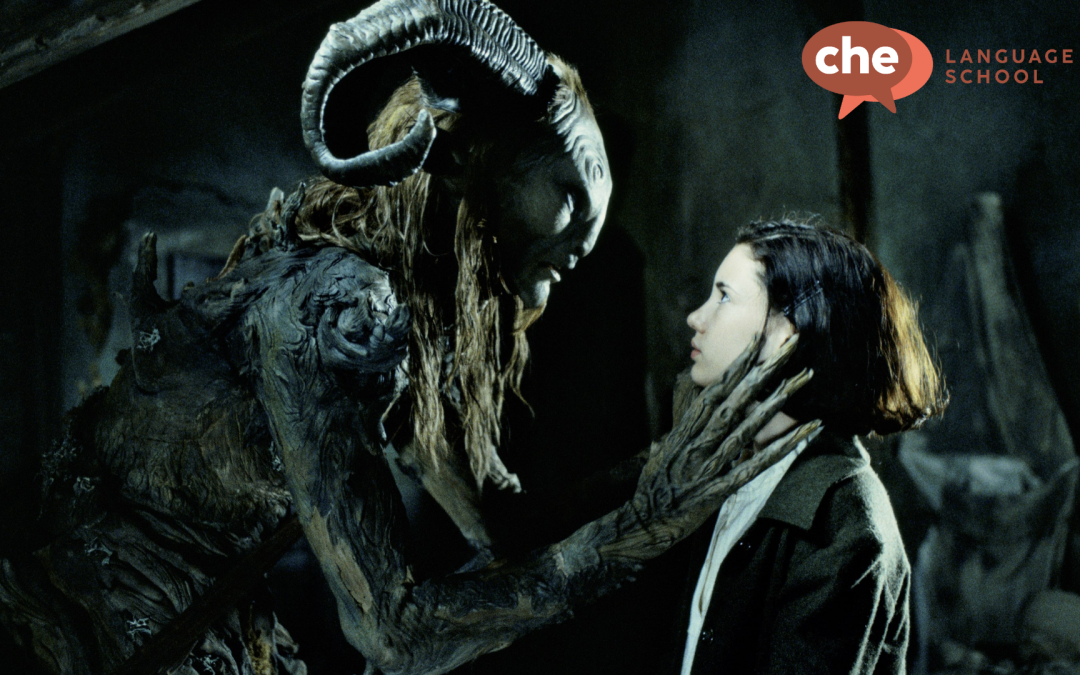Guillermo del Toro’s film, “El Laberinto del Fauno”, is set in 1944, in Franco’s Spain, or post-war Spain.
The main themes that appear throughout the film are:
The Franco’s Regime in “El laberinto del fauno”:
Captain Vidal embodies the ideals of Francisco Franco’s Regime in its most extreme form. The character is shown as violent, macho, selfish and a cruel man, blinded by power and determined to destroy Republican’s ideals regardless of the consequences.
Machismo:
In the film, through the character of Capital Vidal, but also through his commanders, you can see the characteristic ‘machismo’ of the time. Men appear to be in power, violent and bullies; while women were at home, forced to serve as mothers or wives.
The role of women in “El laberinto del fauno”:
Carmen embodies what was expected of decent women during the Spanish dictatorship. She appears to be submissive, obedient, servile, and maternal. Even as a widow, against the wishes of her eldest daughter, and without being in love, she marries the Captain to protect herself and her children in the society in which they lived. On the contrary, Ofelia and Mercedes, are rebellious before what is demanded of them in the society of 1940. Likewise, Mercedes takes advantage of how little women were valued at the time to spy on the commanders and conspire against them from within the house
Fantasy and fairy tales in “El laberinto del fauno”:
The director uses fantasy and fairy tales as an allegory for the cruel reality that Spain experienced during the post war period. Comparisons are constantly made between the real world and the fantastic world, using symbolism. Through the events that occur in the fantasy world, the protagonist seeks to understand the cruel events that surround her in the real world.
A Level Spanish: ¿Qué temas trata la película “El Laberinto del Fauno”?
La película de Guillermo del Toro, “El Laberinto del Fauno”, se sitúa en 1944, en La España de Franco, o España post guerra.
Los temas principales que se tocan a lo largo de le película son:
El régimen Franquista:
El Capitán Vidal encarna los ideales del Régimen de Francisco Franco en su forma más extrema. El personaje se muestra como un hombre violento, machista, egoísta y cruel, cegado por poder y determinado a destruir los ideales Republicanos sin importar las consecuencias.
El machismo:
En la película, a través del personaje del Capital Vidal, pero también de sus comandantes, se puede ver el machismo característico de la época. Los hombres al poder, violentos y mandamases; mientras que las mujeres se encontraban en sus casas, obligadas a servir como madres o esposas.
El rol de la mujer:
Carmen encarna el rol esperado de las mujeres durante la dictadura española. Sumisa, obediente, servil, y madre. Inclusive, siendo una viuda, en contra de los deseos de su hija mayor, y sin estar enamorada, ella contrae matrimonio con el Capitán para protegerse y a sus hijos en la sociedad en la que vivían. Por el contrario, Ofelia y Mercedes, se muestran rebeldes ante lo que es exigido de ellas en la sociedad de 1940. Asimismo, Mercedes se aprovecha del poco valor que tenían las mujeres en esa época para espiar a los comandantes y confabular contra ellos desde adentro de la casa.
La fantasía y los cuentos de hadas:
El director usa la fantasía y los cuentos de hadas como una alegoría a la cruel realidad que vivía España durante la post guerra. Constantemente se hacen comparaciones entre el mundo real y el mundo fantástico, utilizando simbolismos. A través de los hechos que ocurren en el mundo de fantasía, la protagonista busca comprender los crueles hechos que la envuelven en el mundo real.

